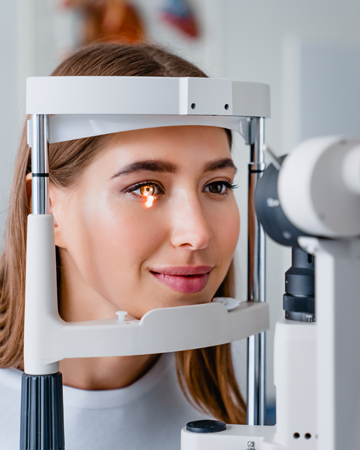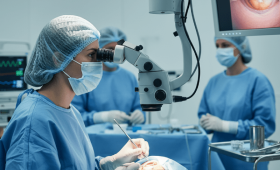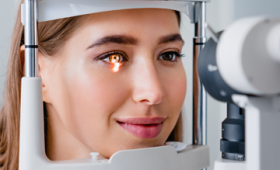Is Laser Eye Surgery In Turkey Truly Safe?
Turkey has become a significant center in health tourism and offers services for laser eye surgeries that meet international standards. The clinics in the country are equipped with the latest technology and staffed by experienced eye surgeons.
Operations are performed in sterile environments with high hygiene standards. Safety begins with the patient undergoing a comprehensive pre-examination to determine their suitability for the surgery. This process minimizes risks while maximizing the success rate. With their experience in this field, clinics in Turkey present a reliable option for those considering laser eye surgery.
How Experienced Are Turkish Eye Surgeons?
Turkish eye surgeons are known for their many years of experience and international training. Most surgeons have studied abroad or attended seminars to stay updated on the latest treatment methods.
They are experts not only in laser surgeries but also in more complex operations such as cataract and retina procedures. This experience plays a critical role in providing an accurate diagnosis and performing the surgery with the highest possible success rate. Patients can feel more secure knowing they are in competent and experienced hands.
What Are The Latest Technologies For Laser Eye Surgery?
Modern eye clinics in Turkey use the latest laser technologies to increase the success of the treatment. Advanced systems such as Femtosecond laser (for LASIK), excimer laser (for reshaping the cornea), and wavefront technology are widely used. These technologies ensure that the surgery is more precise, faster, and safer. Wavefront technology, in particular, allows for a personalized treatment plan by creating a unique map of the eye. Advanced technologies also significantly improve post-operative vision quality.
What Examinations Are Performed Before Surgery?
The comprehensive examination performed before laser eye surgery is one of the most important stages of the treatment. The patient’s eye structure, corneal thickness, intraocular pressure, topographic map of the eye, and the degree of vision impairment are examined in detail. These examinations determine whether the patient is a suitable candidate for the surgery and ensure that the most appropriate laser treatment method is chosen. At the same time, potential risk factors or other issues related to eye health are also identified during this process.
How Long Is The Post-Surgery Recovery Period?
The recovery period after laser eye surgery is generally quite fast. Most patients begin to see clearly within the first few hours after the operation. A slight stinging or watering sensation may be experienced on the first day, but these symptoms disappear within a few days. It may take a few weeks for the eyes to heal completely and for vision to stabilize. During this process, it is very important to use eye drops regularly and follow the doctor’s recommendations. Patients can usually return to their normal lives within a few days.
What Are The Possible Side Effects Of Laser Eye Surgery?
The possible side effects of laser eye surgery are generally mild and temporary. After the surgery, conditions such as dry eyes, sensitivity to light, or halos and glare in night vision may be experienced. These side effects usually resolve on their own within a few weeks and can be controlled with eye drops. Serious complications are extremely rare and can be almost completely eliminated with proper patient selection and an experienced surgeon.
Why Is The Cost Of Laser Surgery In Turkey Lower Than In The UK?
The main reasons why the cost of laser eye surgery in Turkey is lower than in the UK are the more affordable operational expenses and the exchange rate. Clinics in Turkey have an advantage in terms of staff salaries and general operational costs. This allows hospitals to offer the same quality of service at more competitive prices. Patients can also save a significant amount on travel and accommodation costs in addition to the treatment expenses.
Is It Necessary To Wear Glasses After Laser Eye Surgery?
The primary goal of laser eye surgery is to clarify the patient’s vision without the need for glasses or contact lenses. Most patients do not need to wear glasses after the surgery. However, in cases such as presbyopia (age-related near vision impairment), reading glasses may be needed for close distances. The success of the surgery may vary depending on the patient’s initial degree of vision impairment and the type of surgery.
Who Are The Best Candidates For Laser Eye Surgery?
The best candidates for laser eye surgery are individuals who have a stable prescription, good general eye health, suitable corneal thickness, and are over 18 years of age. Some chronic diseases, such as diabetes or autoimmune disorders, may be an obstacle to the treatment. A detailed examination determines with certainty whether a person is suitable for the surgery. This assessment is critical for the success and safety of the treatment.
What Are The Long-Term Effects Of Laser Eye Surgery?
Laser eye surgery is an effective method that permanently corrects vision in the long term. After the surgery, the vast majority of patients do not expect a recurrence of their vision impairment. However, natural processes such as age-related vision changes (presbyopia) can progress independently of the surgery. Regular eye check-ups and healthy lifestyle habits are important for maintaining eye health.
Can I Use Contact Lenses After Laser Surgery?
Contact lens use is generally not recommended for the first few months after laser eye surgery. Contact with any foreign object should be avoided during this period to allow the eyes to heal completely. After full recovery, contact lenses may be allowed in some special cases (e.g., for cosmetic purposes), but this must be done with a doctor’s approval.
Is Laser Eye Surgery Applicable To All Prescriptions?
Laser eye surgery is an effective method for correcting common vision impairments such as myopia, hyperopia, and astigmatism. However, the range of prescriptions that can be treated depends on the thickness of the cornea and the eye structure. Generally, myopia up to -10 diopters and hyperopia up to +6 diopters can be treated. Surgery may not be suitable for people with very high prescriptions or very thin corneas.
Is Pain Felt During The Surgery?
The patient generally does not feel any pain during laser eye surgery. Before the operation, the eyes are numbed with special anesthetic drops. Thanks to these drops, the procedure becomes completely painless. During the surgery, the patient may only feel a slight pressure or vibration. This ensures that the patient feels comfortable and safe. A slight stinging sensation after the operation is considered normal.
Is Laser Eye Surgery A Permanent Solution?
Yes, laser eye surgery is a permanent solution for vision defects. The laser permanently changes the shape of the cornea, allowing light to focus correctly on the retina. In this way, the vision impairment is permanently corrected. Vision quality changes that may occur after the surgery due to age are a natural process and are independent of the success of the surgery.
Does Dry Eye Affect Laser Surgery?
Yes, dry eye is an important factor that affects laser eye surgery. Patients with severe dry eye before the surgery may be at risk of this condition worsening after the surgery. Therefore, if dry eye is diagnosed during the pre-operative examination, it must be treated first. After the surgery, the condition can be controlled by keeping the eyes moist with special eye drops.
Which Type Of Laser Surgery Is Right For Me?
Which type of laser surgery is most suitable for you is determined after a comprehensive pre-examination. LASIK is the most common method with the fastest recovery period. PRK may be more suitable for patients with thinner corneas. New-generation methods such as Smile or ReLEX are also ideal for certain conditions. The decision is made by considering your eye structure and lifestyle. You can determine the most suitable treatment method for you with Cure Holiday.
Is There An Age Limit For Laser Eye Surgery?
There is generally an age limit of 18 for laser eye surgery. This is the minimum age required for the eye prescription and eye structure to stabilize. Although there is no upper age limit, additional eye diseases such as cataracts may be present in older patients. In this case, other treatments like cataract surgery may be preferred instead of laser surgery.
How Often Should Eye Check-Ups Be Done After Surgery?
Regular check-ups after laser eye surgery are of great importance for monitoring the recovery process and early diagnosis of possible complications. Check-ups are usually done on the first day, one week, one month, and six months after the surgery. These check-ups are necessary to ensure that your eye health is stable.
Can Astigmatism Be Corrected With Laser Surgery?
Yes, astigmatism can be effectively corrected with laser eye surgery. Astigmatism is caused by the irregular shape of the cornea. Laser technology corrects this irregular shape of the cornea, allowing light to focus correctly on the retina. Most laser surgery methods have the ability to correct astigmatism along with myopia and hyperopia.
When Can I Travel By Plane After Laser Surgery?
Air travel can usually be done within a few days after laser eye surgery. However, it is important to take precautions against dry eyes. The dry air inside the plane can increase dry eye symptoms. Therefore, it is recommended to use lubricating eye drops and drink plenty of fluids during the journey. The best thing for patients is to plan their travels by consulting their doctors. Cure Holiday plans your entire travel organization for you.
When Can I Return To Work After Laser Eye Surgery?
The time to return to work after laser eye surgery varies depending on the patient’s recovery speed and the nature of their job. Most patients can return to their normal work within one or two days after the surgery. However, for those who work at a computer or in dusty environments, it might be better to rest for a few more days. This increases post-operative comfort and speeds up recovery.
What Are The Benefits Of Laser Surgery For Eye Health?
Laser eye surgery not only corrects vision impairment but also eliminates the difficulties associated with wearing glasses and contact lenses. It reduces problems such as allergies, infections, or dryness caused by glasses and lens use. It also allows patients to be more comfortable and free in their daily lives. From an aesthetic point of view, it also increases people’s self-confidence.
Do I Blink During Laser Eye Surgery?
It is not possible to blink during laser eye surgery. The eye is held open with a special eyelid speculum. This instrument keeps the eye open during the surgery. Modern laser systems have advanced tracking systems (eye trackers) that can follow and stop even the smallest movement of the eye. Thanks to this technology, the eye moving during the surgery does not pose any risk.
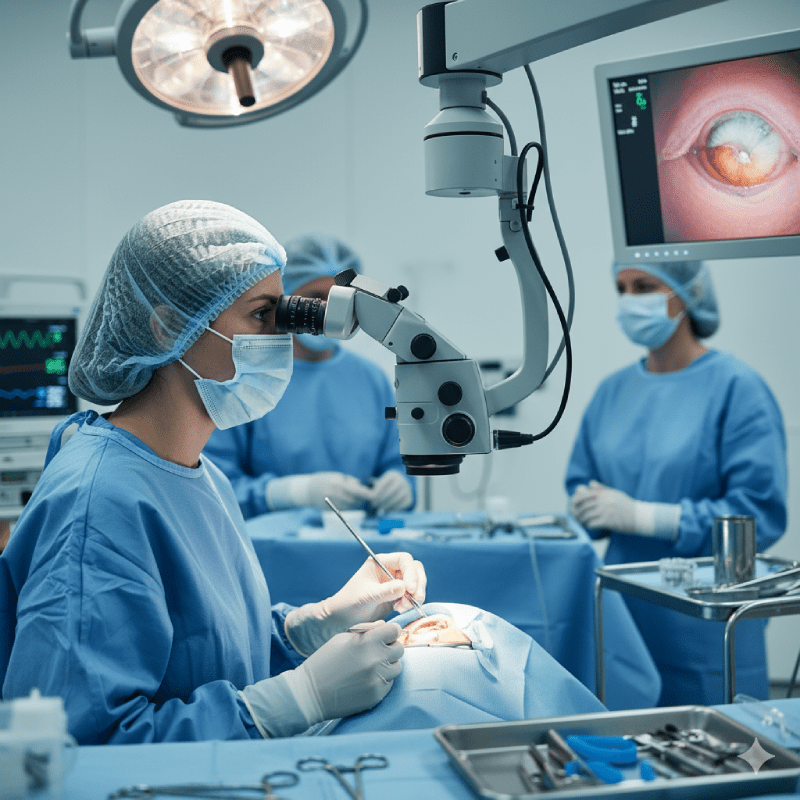
What Is Included In The Price Of Laser Surgery?
The price of laser eye surgery usually includes the pre-operative examinations, the surgery itself, and post-operative check-ups. However, prices may vary depending on the technology used and the type of surgery. It is important to get detailed information about the services included in the price. For example, some clinics may also include medications or check-ups within the first week in the package. Firms like Cure Holiday offer a transparent pricing policy.
Can I Drive After Laser Surgery?
Driving after laser eye surgery depends on the patient’s visual clarity and overall recovery. Most patients see well enough to drive one or two days after the surgery. However, it is recommended to avoid driving at night for the first few days, as halos and glare may be experienced, especially during night driving. It is not advisable to get behind the wheel without a doctor’s approval.
Why Is It Important To Wear Sunglasses After Laser Surgery?
Wearing sunglasses after laser eye surgery is very important to protect the eyes from harmful UV rays and external factors such as wind and dust. The eyes become more sensitive after surgery and may be more susceptible to sunlight. Sunglasses speed up the healing process and reduce possible discomfort. Therefore, wearing sunglasses when going out for the first few weeks is highly recommended.
When Can I Wear Makeup After Laser Surgery?
Wearing makeup after laser eye surgery is not recommended for the first few weeks as it can increase the risk of eye infection. Eye makeup can cause bacteria or chemical substances to enter the surgical area. Generally, makeup is allowed approximately 2-4 weeks after the surgery. During this process, it is very important to follow the doctor’s instructions and pay attention to hygiene.
Can I Do Sports After Laser Eye Surgery?
The routine for sports after laser eye surgery varies depending on the sport. For the first few weeks, sports that may put the eyes at risk, such as swimming or contact sports, should be avoided. Activities like light walking or jogging can be done a few days after the surgery. A certain period should be waited for weight lifting or intense exercises. Your doctor will provide the most accurate information on this matter.
What Are The Risks Of Laser Surgery?
Although laser eye surgery is generally a safe procedure, it can carry some risks. These include infection, dry eye, halos or glare in night vision, and, in rare cases, a decrease in vision quality. These risks are minimized with proper patient selection and when the surgery is performed by an experienced surgeon. Remember that every surgical operation has certain risks.
Do Clinics In Turkey Comply With International Standards?
Yes, many eye clinics in Turkey have international accreditations (e.g., JCI) and provide services that comply with European and US standards. These clinics use advanced technological devices and work with surgeons who have international experience. In this way, laser eye surgeries performed in Turkey are offered with the same quality as treatments in other leading countries in the world.
Does The Glasses Prescription Change After Laser Surgery?
Laser eye surgery can permanently correct the existing glasses prescription. After the surgery, the prescription usually approaches zero or is eliminated completely. However, conditions such as age-related near vision impairment (presbyopia) can progress independently of the surgery, and in this case, reading glasses may be needed.
Can Laser Surgery And Cataracts Be Treated At The Same Time?
Laser eye surgery and cataracts are generally not treated at the same time. Laser eye surgery reshapes the cornea, while cataract surgery is done by replacing the natural lens inside the eye. The treatments for these two conditions are different. If a patient is suitable for both laser surgery and has a cataract, the cataract surgery is usually performed first.
What Are The Frequently Asked Questions After Laser Eye Surgery?
The most frequently asked questions after laser eye surgery are related to the recovery process, side effects, driving, and doing sports. Patients often wonder how long the surgery will take, whether they will feel pain, and when they can return to their normal lives. The answers to these questions ensure that the patient acts consciously during the pre- and post-operative process. Cure Holiday helps you in this regard.
Who Is Not A Suitable Candidate For Laser Surgery?
Laser eye surgery is not suitable for people with a very thin cornea, a progressive vision impairment, severe dry eye, corneal diseases like keratoconus, or some autoimmune diseases. Pregnant or breastfeeding women should also postpone this treatment. These conditions can reduce the success rate of the surgery and increase the risks.
How Are Post-Operative Check-Ups Followed?
Post-operative check-ups are critical for monitoring the patient’s recovery process. The first check-up is usually done one day after the surgery, followed by one week, one month, and three months later. During these check-ups, the eye doctor evaluates how your eyes are healing, adjusts the use of eye drops, and takes precautions against possible problems. For patients coming from abroad, firms like Cure Holiday make it easier to follow up on these check-ups.
